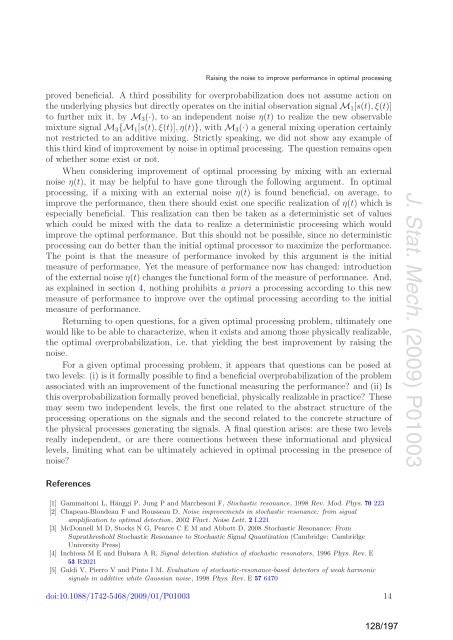a la physique de l'information - Lisa - Université d'Angers
a la physique de l'information - Lisa - Université d'Angers
a la physique de l'information - Lisa - Université d'Angers
Create successful ePaper yourself
Turn your PDF publications into a flip-book with our unique Google optimized e-Paper software.
Raising the noise to improve performance in optimal processing<br />
proved beneficial. A third possibility for overprobabilization does not assume action on<br />
the un<strong>de</strong>rlying physics but directly operates on the initial observation signal M1[s(t),ξ(t)]<br />
to further mix it, by M3(·), to an in<strong>de</strong>pen<strong>de</strong>nt noise η(t) to realize the new observable<br />
mixture signal M3{M1[s(t),ξ(t)],η(t)}, withM3(·) a general mixing operation certainly<br />
not restricted to an additive mixing. Strictly speaking, we did not show any example of<br />
this third kind of improvement by noise in optimal processing. The question remains open<br />
of whether some exist or not.<br />
When consi<strong>de</strong>ring improvement of optimal processing by mixing with an external<br />
noise η(t), it may be helpful to have gone through the following argument. In optimal<br />
processing, if a mixing with an external noise η(t) is found beneficial, on average, to<br />
improve the performance, then there should exist one specific realization of η(t) whichis<br />
especially beneficial. This realization can then be taken as a <strong>de</strong>terministic set of values<br />
which could be mixed with the data to realize a <strong>de</strong>terministic processing which would<br />
improve the optimal performance. But this should not be possible, since no <strong>de</strong>terministic<br />
processing can do better than the initial optimal processor to maximize the performance.<br />
The point is that the measure of performance invoked by this argument is the initial<br />
measure of performance. Yet the measure of performance now has changed: introduction<br />
of the external noise η(t) changes the functional form of the measure of performance. And,<br />
as exp<strong>la</strong>ined in section 4, nothing prohibits aprioria processing according to this new<br />
measure of performance to improve over the optimal processing according to the initial<br />
measure of performance.<br />
Returning to open questions, for a given optimal processing problem, ultimately one<br />
would like to be able to characterize, when it exists and among those physically realizable,<br />
the optimal overprobabilization, i.e. that yielding the best improvement by raising the<br />
noise.<br />
For a given optimal processing problem, it appears that questions can be posed at<br />
two levels: (i) is it formally possible to find a beneficial overprobabilization of the problem<br />
associated with an improvement of the functional measuring the performance? and (ii) Is<br />
this overprobabilization formally proved beneficial, physically realizable in practice? These<br />
may seem two in<strong>de</strong>pen<strong>de</strong>nt levels, the first one re<strong>la</strong>ted to the abstract structure of the<br />
processing operations on the signals and the second re<strong>la</strong>ted to the concrete structure of<br />
the physical processes generating the signals. A final question arises: are these two levels<br />
really in<strong>de</strong>pen<strong>de</strong>nt, or are there connections between these informational and physical<br />
levels, limiting what can be ultimately achieved in optimal processing in the presence of<br />
noise?<br />
References<br />
[1] Gammaitoni L, Hänggi P, Jung P and Marchesoni F, Stochastic resonance, 1998 Rev. Mod. Phys. 70 223<br />
[2] Chapeau-Blon<strong>de</strong>au F and Rousseau D, Noise improvements in stochastic resonance: from signal<br />
amplification to optimal <strong>de</strong>tection, 2002 Fluct. Noise Lett. 2 L221<br />
[3] McDonnell M D, Stocks N G, Pearce C E M and Abbott D, 2008 Stochastic Resonance: From<br />
Suprathreshold Stochastic Resonance to Stochastic Signal Quantization (Cambridge: Cambridge<br />
University Press)<br />
[4] Inchiosa M E and Bulsara A R, Signal <strong>de</strong>tection statistics of stochastic resonators, 1996 Phys. Rev. E<br />
53 R2021<br />
[5] Galdi V, Pierro V and Pinto I M, Evaluation of stochastic-resonance-based <strong>de</strong>tectors of weak harmonic<br />
signals in additive white Gaussian noise, 1998 Phys. Rev. E 57 6470<br />
doi:10.1088/1742-5468/2009/01/P01003 14<br />
128/197<br />
J. Stat. Mech. (2009) P01003


